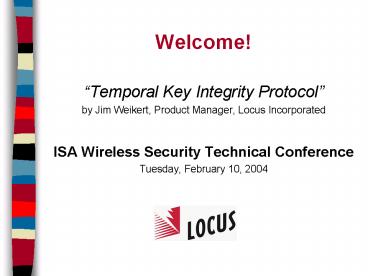Temporal Key Integrity Protocol - PowerPoint PPT Presentation
1 / 21
Title:
Temporal Key Integrity Protocol
Description:
Algorithm is used throughout the world in some of the most secure ... Poor key generation (cracked encryption key) Poor duplicate checking (replay attacks) ... – PowerPoint PPT presentation
Number of Views:75
Avg rating:3.0/5.0
Title: Temporal Key Integrity Protocol
1
Welcome!
- Temporal Key Integrity Protocol
- by Jim Weikert, Product Manager, Locus
Incorporated - ISA Wireless Security Technical Conference
- Tuesday, February 10, 2004
2
Using a Good Tool Improperly
3
Concepts to Understand
- Authentication
- Verifying only authorized users are allowed to
communicate - Encryption
- Scrambling the data so that it cannot be
deciphered by outsiders
4
The Good Tool Used Properly
- 802.11 WEP encryption is based on a very strong
and time-proven algorithm - Algorithm is used throughout the world in some of
the most secure applications - SSL (Secure Socket Layer) Protocol is used for
communications to and from secure websites - Oracle SQL
5
The Good Tool Used Improperly
- WEP is an example of using a good tool improperly
- Poor authentication (rogue access point)
- Poor key generation (cracked encryption key)
- Poor duplicate checking (replay attacks)
6
802.11 Industry Improvements
- IEEE 802.11i
- New IEEE standard for 802.11 security
- WPA (Wi-Fi Protected Access)
- The 802.11 industrys acronym for the improved
security
7
The Good Tool Used Properly
- Better authentication
- Better encryption
8
Security Better Authentication
- WEP (only client authenticated itself to AP)
- Rogue AP could cause client to authenticate to
it falsely and gain access to clients
information - Dual authentication
- Client and AP authenticate each other, verifying
the link is appropriate
9
WPA Better Authentication
WEP
WPA
Dual Authentication Two-way Handshake
Shared
10
Key Generation
Ethernet
- WEP System-wide Key
- common for every radio
Key
- TKIP Session Key
- different for every pair
- different for every station
- generated for each session
- derived from a seed called the passphrase
Access Point
Session Key A
Session Key B
Key
Key
Client
Client
Network-wide Key
Entered once or updated by user if they feel like
it.
11
Per-Packet Keying
- Each packet is generated using a unique key
- Much more difficult to get from repetitive data
back to the key - Packet sequence number rollover
- 24-bit sequence number with WEP would rollover
leading to key re-use - 48-bit sequence number with TKIP leads to new
session key generation
12
Per Packet Keying (cont.)
Phase One Mixer
Intermediate Key
128-bit Temporal Key
Source MAC Address 00-01-50-F1-CD-73
Phase Two Mixer
Per-Packet Key
4 Bytes
48-bit Packet Sequence Number (24-bit with WEP)
2 Bytes
Encryption Algorithm
Data
Encrypted Data
13
Integrity Check
- If the message integrity check does not pass, the
message is seen as a forgery - If two forgeries are detected in one second, the
radio assumes it is under attack. It deletes its
session key, disassociates itself, then forces
re-association.
14
Integrity Check (cont.)
48-Bit Sequence Number
Message Integrity Check
MAC Address
Data Load
15
Replay Prevention
- Replay
- WEP could overload an AP by replaying the
previous packet - TKIP each packet has a 48-bit counter value that
must increment or packet is discarded
Bad Guy
Bad Guy
Replays
Network
Network
User
User
16
RADIUS Server
- Authenticates clients before they are given
access to the network - Negotiates keys
Network
Access Point
Client
Radius Server
17
Need for a RADIUS Server
- Single point of key management
- Centralized administration
- Mix WEP/WPA amongst clients
- Seamless roaming without re-authentication
- Session time limits/time of day (user access
policies)
18
Security is Widely Adopted
- Company 1 logo
- Company 2 logo
- Company 3 logo
19
More Security to Come
- 802.11i addresses immediate improvements as well
as long-term improvements - Immediate improvements seen in WPA (TKIP
Encryption) can run on current hardware - Long-term improvements include new encryption
algorithm AES (Advanced Encryption Standard)
which is more computationally intensive and
requires new hardware
20
Having the Best Security is Useless if...
- It isnt turned on
- like having locks on your doors but not using
them - It is too complicated to understand
- like having a security system for your house, but
not knowing how to change the code
21
Questions?
- Thank you!
- Jim Weikert, Product Manager
- (608) 270-0500 ext. 219
- weikert_at_locusinc.com
- Locus Industrial Radios
- Madison, WI

